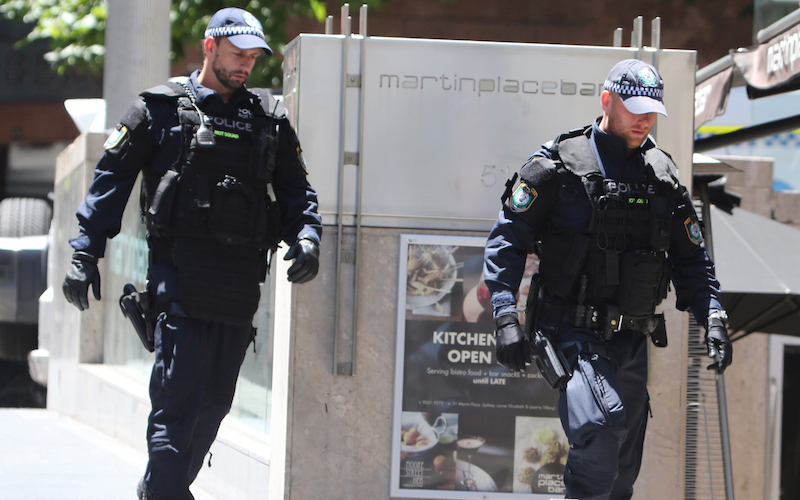
Siege in Sydney: Terrorism and the Security State
The Sydney café siege continues to garner attention, producing a firestorm on social media and speculation from the commentariat. Much of it remains speculative, though members of the Australian government will be expressing some delight at its worth. Things have been rather poor for the Tony Abbott government of late.
All it took was for a hostage taker to walk into the Lindt Café in the busy Martin Place area of the city, and brandish a flag with Islamic inscription. It did not matter that this flag was of a “garden variety” sort – the initial statement from an employee of the café – a certain Bruno – was that it was an ISIS flag.
The observation became a swiftly minted reality, and it did not matter that Bruno could not read what the inscription said, let alone realise that it was not an ISIS flag but a Shahada item: “There is no God but Allah, and Mohamed is his messenger.” In the meantime, five hostages have fled the scene and the siege continues.
Media outlets have had to come out with “Sydney siege facts” to combat bits of “misinformation,” a wonderful distraction from hum drum reporting and the dry, distant recycling of foreign stories.
“Events began around 9.45 am today when a woman saw a man outside the café with a blue sports bag that appeared to contain a gun and the situation is ongoing.” Australia could claim, at last, that it was on the terrorist map.
Security commentators then sought to understand what such a fellow would be doing holding up a Lindt shop in the business heart of Sydney. Yes, the sort of place where customers would stream in with frequency, and eager to grab a coffee on the way to work. But the symbolism certainly seems poor. Sydney has a range of rich targets for any aspiring terrorist – the iconic inventory is considerable. But a Lindt café?
A theory started to gain a tenuous foothold: it was a “botched” operation, one where the hostage taker had been rattled. Adam Dolnik, a hostage-negotiation specialist and academic at the University of Wollongong, suggested that the person was “a low trained, lone wolf rather than someone with a direct connection with terrorist groups.” Instead of progressing to his original target, he took cover in the café. Speculation tends to be a deep reservoir.
It says everything about the hunger of the media and the chip on Australia’s security shoulder that such a holdup has gotten as much attention as it has. While the police have issued calls for limiting social media coverage, fearing an impact on operational matters, the train of attention continues to busy itself.
Everyone in Fortress Australia is keen for a glance and gaze. After all, the Australian government has made security a pillar of its otherwise impoverished policy platforms, passing legislation to punish returning foreign fighters, and ramping up penalties for disclosures of secret intelligence operations. All of this, supposedly, to combat a spike in Islamic radicalisation (we are not told that there are any other forms).
Many of these policies have been implemented in a cultural and political vacuum – deploying Australian troops to engage in yet another Middle Eastern adventure on the pretext of humanitarian salvation. Meddling in the affairs of other states for reasons of halting a humanitarian catastrophe continues to be a poor alibi, but it remains on the public relations books of governments.
At home, the security response has also been dramatic, even ludicrously so. Three months ago, an overly theatrical use of force – a weighty 800 police, equipped with helicopters and media crew – swooped in across western Sydney and areas in Brisbane. The operations yielded a small quarry: Omarjan Azri, who was charged with counter-terrorism related offences.
Prime Minister Tony Abbott, happy to throw away any notions of proof, had already found the suspect guilty. He also accompanied this with suggestions that a killer-to-be would be wondering the streets of Sydney desperate to find someone to behead in suitably spectacular manner.
Veteran media analyst Richard Ackland, in examining the crisis, has pointed out with sharp accuracy that, “Much depends on the fate of the unfortunate souls trapped in a Sydney café – the future of Australia’s burgeoning security state not least of all.” According to Ackland, the approach from the political classes has been “downbeat,” at least relative to the “paranoia” that had characterised the September raids.
Not all have followed suit. “Death Cult CBD Attack – The Instant We Changed Forever,” screamed the headlines of the Daily Telegraph. Evidence can be rather troubling when readers are being sought. Other responses have been less dramatic, calling for a splash of tolerant affirmations and dousing the fires before they get out of hand. The twitter handle #illridewithyou has blossomed, a call to non-Muslim travellers to maintain solidarity with Muslims.
International watchers are also keeping their eyes open. The British Prime Minister, David Cameron, has made use of his Twitter account to speak about the siege. Then come the ordinary fare: tourists keen for a gory grab and distasteful selfies near the sealed perimeter. But for all of this, nothing has “changed forever.” What did change was the nature of the security state, which is galloping ahead of Parliament and citizen. And this now overweight entity did very little to prevent an armed man walking into a Lindt café shop in central Sydney on a Monday morning.

